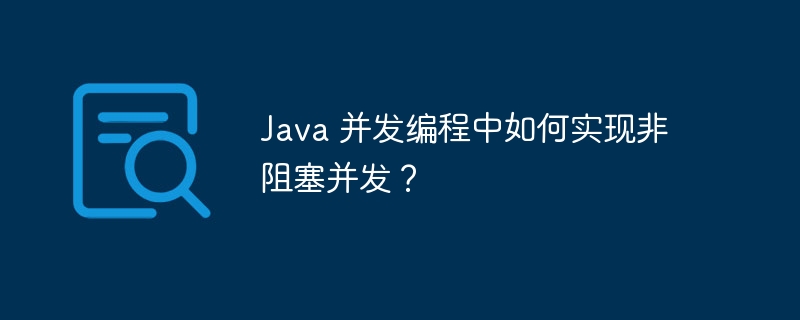Home >Java >javaTutorial >How to implement non-blocking concurrency in Java concurrent programming?
How to implement non-blocking concurrency in Java concurrent programming?
- WBOYWBOYWBOYWBOYWBOYWBOYWBOYWBOYWBOYWBOYWBOYWBOYWBOriginal
- 2024-05-08 21:39:011069browse
It is crucial to achieve non-blocking concurrency in Java, which can be achieved in the following ways: using the Future and CompletableFuture classes: Future represents the result of asynchronous calculation, and CompletableFuture extends Future with a richer API and more convenient usage. CompletableFuture can be used to execute time-consuming tasks asynchronously, allowing the application to process the results after the task is completed while continuing to perform other tasks, improving responsiveness.

Java Concurrent Programming: Implementing Non-Blocking Concurrency
In Java, implementing non-blocking concurrency is a crucial technology because it can improve application Program performance and responsiveness. Non-blocking concurrency allows multiple threads to work on different tasks simultaneously without waiting for each other to complete.
Using Future and CompletableFuture
Java’s Future and CompletableFuture classes are a good way to implement non-blocking concurrency. Future represents the result of an asynchronous calculation, and CompletableFuture is an extension of Future, with a richer API and more convenient usage.
The following is a small example of using CompletableFuture to achieve non-blocking concurrency:
import java.util.concurrent.CompletableFuture;
public class NonBlockingExample {
public static void main(String[] args) {
// 创建一个 CompletableFuture,用于计算一个质数列表
CompletableFuture<List<Integer>> primeListFuture = CompletableFuture.supplyAsync(() -> calculatePrimeNumbers(10000));
// 继续执行其他任务,无需等待质数列表计算完成
System.out.println("Continuing with other tasks...");
// 当质数列表计算完成后,处理结果
primeListFuture.thenAccept(list -> {
System.out.println("Prime numbers calculated:");
list.forEach(System.out::println);
});
}
private static List<Integer> calculatePrimeNumbers(int limit) {
// 模拟计算质数列表的耗时操作
try {
Thread.sleep(5000);
} catch (InterruptedException e) {
e.printStackTrace();
}
List<Integer> primes = new ArrayList<>();
for (int i = 2; i <= limit; i++) {
if (isPrime(i)) {
primes.add(i);
}
}
return primes;
}
private static boolean isPrime(int number) {
for (int i = 2; i <= number / 2; i++) {
if (number % i == 0) {
return false;
}
}
return true;
}
}In this example, the calculatePrimeNumbers method is a time-consuming Operation, represents a background task that may take a large amount of time. By using CompletableFuture, we can execute this task asynchronously and process the results upon completion without waiting for the task to complete. This way, our application can continue to perform other tasks, improving responsiveness.
The above is the detailed content of How to implement non-blocking concurrency in Java concurrent programming?. For more information, please follow other related articles on the PHP Chinese website!

